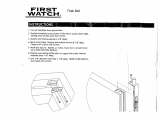Step 1
Door Preparation
• For new construction installations, the door manufacturer
shall prepare the door using the SAFLOK MT Door Prep. Template
(see MT Door Prep. Template). The door edge prep. is a standard
full mortise prep. for a 1-1/4˝ x 8˝ front plate (a 1˝ x 8 ˝ and
1˝ x 7-3/4˝ custom front is available). The door surface holes
are customized for the SAFLOK trim.
Step 2
Door Preparation -
Retrofit
• For retrofit installations, remove the existing hardware and
assure that the door edge prep. is appropriate for the SAFLOK
mortise lock (see Fig. 1). Position and clamp the drill fixture
onto the door. The fixture has two positioning posts that rest
inside the 1-1/4˝ x 8˝ x 15/16˝ deep mortise pocket,
establishing the proper backset for the trim.
• When the fixture is clamped, its surfaces should be parallel
with the door surfaces and door edge. Drill the holes from
both sides without disturbing the fixture’s position. One 3/4˝
hole needs to be on the inside door surface only. Remove the
fixture and complete the rectangular cutout by sawing or
grinding between the four holes. Also, notch material on the
inside surface for easier routing of the motor wire. After
machining, remove debris from the mortise cutouts.
Step 3
Mortise Case Installation
• The mortise front plate has an adjustable bevel. Align the
front plate to the bevel of the door edge and tighten the two
bevel adjust screws at the top and bottom of the mortise case.
Position the mortise case in the door edge with the motor wire
routed out the notch (see Fig. 2). Use care to ensure the motor
wires do not get pinched or pulled as the mortise is inserted
into the pocket.
• Fully tighten the two #12 screws to firmly attach the
mortise front to the door. Under no circumstances should
these screws be left loose or tightened after the lock trim
is installed. (If this ever seems necessary, the door prep.
machining is incorrect.) Install the strike and scalp plates
with the screws provided and test for proper mechanical
latch engagement into the strike plate.
Step 4
Lock Trim Installation
• Both the outside and inside trim assemblies have 1/4˝
alignment pins that fit into holes in the mortise case.
These pins establish an accurate trim position with respect
to the mortise case assembly, allowing the levers and bolt
mechanism to operate freely without binding. The holes
machined in the door surfaces should not influence the trim’s
position. There should be clearance between the features of
the outside trim and the door prep. holes. If the outside trim
fits tightly because the through bolt posts or card reader
enclosure rubs on the door prep. holes, then remove the
mortise and enlarge the holes to achieve a free fit. Under
no circumstances should the 1/4˝ alignment pins be bent
or removed to allow a free fit (see Fig. 3).
• Position the outside trim on the door with the card reader
ribbon cable passing through the rectangular cutout. Use a
card so the ribbon cable does not get pulled or cut. On metal
doors, it may be necessary to deburr the inside rectangular
NOTCH BETWEEN
HOLES FOR WIRE CLEARANCE
MOTOR WIRE
CHANNEL
MORTISE CASE
ALIGNMENT
PIN
SPINDLE
SPRING
ALIGNMENT
HOLES
SPINDLE
ALIGNMENT
PIN
OUTSIDE TRIM
INSIDE TRIM
MOTOR
WIRE
INSIDE
DOOR
SURFACE
#12 MORTISE
SCREWS
2-3/4˝ x 1-5/8˝ CUTOUT
1-1/4˝ x 8˝ x 15/64˝ DEEP
3/4˝ REQUIRED ON
INSIDE ONLY
INSIDE DOOR
SURFACE
NOTCH FOR WIRE
ROUTING
2-3/4˝ BACKSET
(FIG. 1)
(FIG. 2)
(FIG. 3)
ALIGNMENT PINS
SPINDLE
SPRING
SPINDLE




